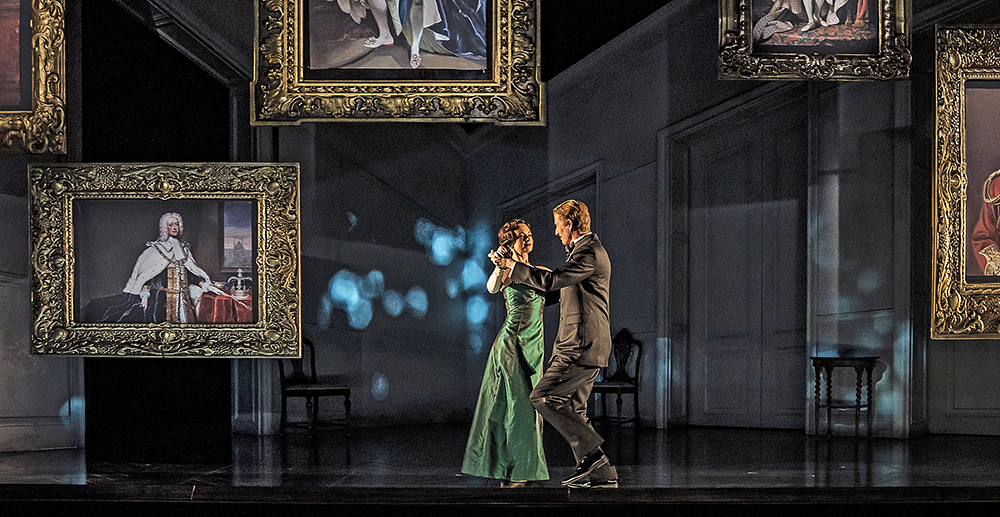Culture
 Photo: Liz Lauren
Photo: Liz Lauren
The Leading Ladies Of The King’s Speech At National Theatre On Relationships, Power And Class
February 11, 2020 @ 12:00am
Here to fuel our generation’s obsession with British royalty, National Theatre is bringing British-American playwright David Seidler’s The King’s Speech to DC from February 11-16. If you’ve seen the 2010 Oscar-winning film, and not the play it was based on, you know the story of a shy, speech-stuttering King George VI (Bertie) who becomes a leader of a nation on the brink of the World War after his father passes and his older brother is abdicated.
While the film has a heavy focus on the relationship between Bertie and his unconventional speech therapist, Lionel Logue, the play is sure to shine a light on the power of the three main female characters who we don’t see enough of in the movie. We chatted with Maggie Lacey (Elizabeth, Duchess of York), Elizabeth Ledo (Myrtle Logue) and Tiffany Scott (Wallis Simpson) about their characters’ strong presence in the play, and their take on the importance of the relationships that unfold in The King’s Speech at DC’s National Theatre.
OT: Tell us about some general differences between the 2010 film directed by Tom Hooper and David Seidler’s theater version of The King’s Speech.
Elizabeth Ledo: The play is very different than the film in many ways, one being some of the characters in the film are either more or less flushed out than in the play. I think it’s two different experiences for audiences, which is thrilling. If you’re more of a history buff, the play is a little more exciting.
Tiffany Scott: The screenwriter David [Seidler] made some changes to the script [more recently] than what you would have seen in the film version. He’s still actively involved in the process, and we’re kind of focusing on the human side and love scene between Wallis and Edward. She shows up quite a bit as a powerful player in the story of the constitutional crisis that led to the abdication. They’re working on flushing her out more. She shows up every now and then to cause some trouble.
OT: That’s great that you still get to actively engage with the original playwright. Any fun facts or tidbits that you’ve learned from him?
EL: When we worked on this in Chicago, he spent a couple days with us. He wrote Myrtle very differently than what was historically accurate. She was happy to be in London. She enjoyed some of the perks that came [with] Lionel’s profession. She had some fun. He needed to create dramatic tension and create this idea that she desperately wanted to go back to Australia. It’s not historically real, and we’re tweaking the story for dramatic effect.
OT: How do the characters of Elizabeth, Myrtle and Wallis differ from each other and how are they the same?
Maggie Lacey: All three have different backstories, regardless of rank or country of origin. They’re all in love with a man who is challenging for them to support, but who also supports their desires in the relationship.
EL: The audience gets a little surprise from how much they end up meeting these threads in the play, too. The relationship between Lionel and Bertie is so fabulous to watch and rewarding, and I think that David has given a voice to these three women in a way that’s kind of a surprise to the audience. They’re going to find the importance that the women play. Maggie and I have a quick uncomfortable moment together between Myrtle and Elizabeth, then Wallis and Elizabeth have this equally awkward fascinating exchange in the top of that queue.
OT: Has it been a learning experience to interact with such a large number of important roles in the play?
ML: It’s been helpful for me to look at the other women’s journeys in the play and learn more about the queen’s. Myrtle for instance, her and the queen are obviously of a different class. It’s a really rich dichotomy there. Wallis, when you [Tiffany] spoke in the rehearsal hall the other day, it was so exciting to hear because it was an American voice coming through. I like the women’s stories and they may not be at the forefront of the play at first glance, but these other actresses have helped me understand my own job.
OT: What do you love most about your characters and what do you wish they did more of or had more of?
TS: I’m really digging the fiery energy that Americans bring into this world, as Maggie mentions, she’s [Wallis is] the one American voice, so I’m trying to find ways she might move around stage differently than everyone else and have her own voice, which is what this play is about.
EL: Myrtle has a heart of gold, she’s kind of salt-of-the-earth. A grounded woman. Lionel and Myrtle’s scenes are fast, generally a page long, and we’re trying to get a lot accomplished in them, so the the challenge of that is a good challenge and I embrace it, though there’s a couple scenes where I’d want them just a little more flushed out.
ML: There’s something about the character [Elizabeth] that I feel is specifically British and wry that I am really interested in. It’s not in our blood as Americans to be loyal, so I’m trying to explore the culture and be as authentic as I can. The conciseness of the language seems to support the concise sort of way that they have of talking and collecting their thoughts and at times is wry and right to the point, which I like a lot.
OT: What are some of the themes in the play that you think are relevant to today’s modern world?
ML: Michael Wilson, our director, talked about the people in this play acting not just for themselves, acting for people connected to them and society as a whole, and that is relevant today. There’s these moments in the play where you’ll know the time is very volatile and we’re on the cusp of the second world war. Hitler is rising to power and fascism, and all this political unrest is happening. These individuals in the U.K. are trying to stay on the right side of history; and that’s all around us right now. History’s never too far from the present.
OT: What are your thoughts on the score behind the play? How big of an impact does the music have on moving the story along?
ML: It’s very cinematic, it’s beautiful, it’s thrilling. The actors are fully encapsulated by the score. I think the set design elements are cinematic in many ways. So you really feel like right away you get drawn in. There’s no way you don’t know that you’re on something that’s a bit epic because it’s just so operatic. It feels like being on a film set at times, and it moves so fast. You go on this wonderful ride as the audience. The design elements on this play are top, top, top notch. He put together quite an incredible group of artists.
OT: Is there anything special that the audience should be on the lookout for?
ML: I wish I had more time in costume, which may sound superficial but it’s not. The costumes are done by David Ward, and he’s a genius. I have all these beautiful dresses that I get to wear for maybe 30 seconds each, so I wish I could show off the clothes for a little bit longer. If you come to see the play, look quickly. Pure artistry is on display.
See The King’s Speech runs at National Theatre from February 11-16. Visit www.thenationaldc.com for times and ticket prices.
National Theatre: 1321 Pennsylvania Ave. NW, DC; 202-628-6161; www.thenationaldc.com







